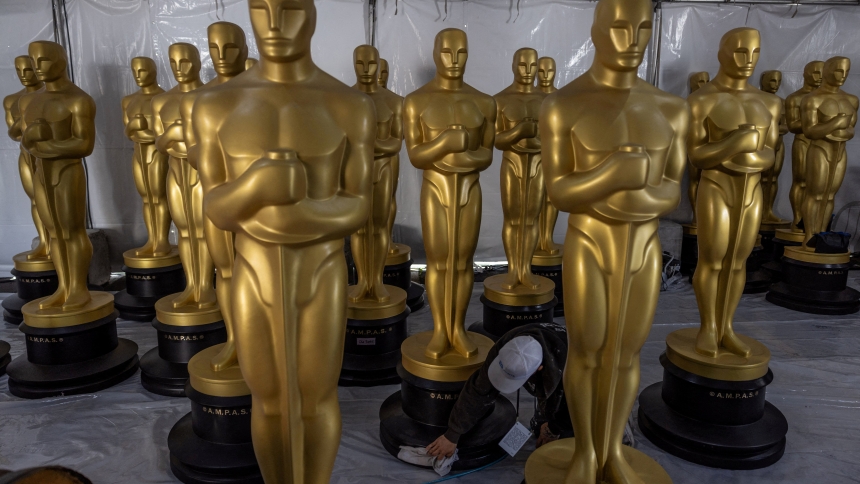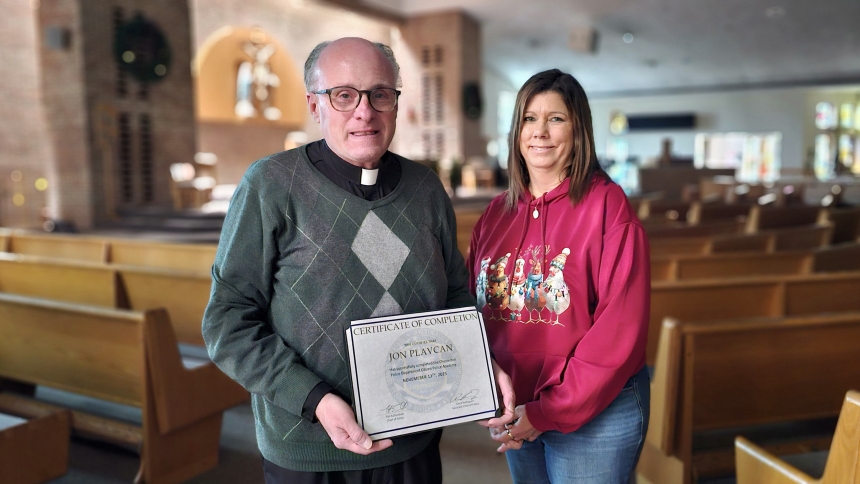
Awards season is particularly exciting for a film reviewer. I enjoy talking about the stunning work of actors, editors, directors, writers, make-up artists, composers and others. But as a Catholic film critic, I tend to focus more on the human quality of the story, while not neglecting the quality of the filmmaking that brings that story to life.
My number one criterion when reviewing a film is how the story upholds the dignity of the human person. As the first principle of Catholic social teaching, depiction of human dignity needs to be taken into account when judging (which is always subjective) whether a film is "good" or not. Is the human person respected and shown with their God-given dignity? If so, then I can usually forgive other less desirable aspects of a film.
With the Academy Awards right around the corner, here's my take on how the 10 nominations for best picture hold up in the human dignity department.
American Fiction
When his editors encourage him to write "Black" books, struggling author Thelonius "Monk" Ellison (Jeffrey Wright) writes a stereotypical Black story as a joke. But when the book becomes popular, he wonders what Black culture is coming to. I found this film fascinating as Black filmmakers (with Cord Jefferson as writer/director) explore the perception of what is "Black," and why African-American stereotypes seem to be so popular with white people.
I was pleased to see that Monk, and some of the people around him, resent common stereotypes, even though Monk chose to profit from those stereotypes (through the success of his mock-book) because he needed money fast to care for his ailing mother. The character of Cliff (Sterling K. Brown) was challenged by his brother, Monk, to rise above his limitations and engage with the family. Overall, an interesting look at racism, family dysfunction and holding on to one's ideals.
Anatomy of a Fall
This French-language film is basically a courtroom drama. When Sandra (Sandra Hüller) wakes up from a nap and hears her blind son, Daniel (Milo Machado-Graner), yelling for her, she discovers her husband's body outside in the snow below their fixer-upper chalet. What follows, as she is put on trial for her husband's murder, is the laying bare of every aspect of their relationship.
The film is exquisitely put together. The judge's decision to let 11-year-old Daniel stay in court, especially as testimony about the couple's troubled marriage became more explicit, was most interesting, especially given that Daniel had argued with the judge to be allowed to stay. As Daniel listened, he was able to better understand some of his own experiences with his father. His newfound understanding propels him into insisting on speaking to the court -- an action which leads to the film's conclusion. It was refreshing and joyful to see a child's perspective taken seriously in film as, let's face it, we adults often don't give kids enough credit for their insights.
Barbie
When I heard a movie about Barbie was coming out, I admit that I groaned -- but I actually was pleasantly surprised at this film. The film depicts the perfect "Barbieland," inhabited by every version of Barbie dolls living an ideal life. But when one Barbie (Margot Robbie) has thoughts of death, she is sent to the Real World to find out what's wrong. Ken (Ryan Gosling) goes with her only to discover the Real World is run by men. He then takes this newly found power back to Barbieland.
When plastic meets real flesh-and-blood, Barbie learns about the pains and joys of real living. She discovers that relationships take work but that joy can be found amid pain. Returning to Barbieland, she leads the revolt against Ken's power-grab, and all the dolls learn something about what it means to have a true purpose. Pretty good for a movie about dolls.
The Holdovers
When an irascible teacher (Paul Giamatti) at a prep school is forced to stay on campus over the holidays with a few students and the grieving cook (Da'Vine Joy Randolph), he forges bonds he never thought possible.
This film is in my top favorites for this year. The human connection that each of the characters make over the holiday break transforms them into better people, even people willing to make sacrifices they would have never imagined before spending quality time together. A tribute to the tenacity of the human spirit.
Killers of the Flower Moon
In the first half of the 20th century, the Osage Tribe strikes oil, and they become the richest Native Americans in the country. Filled with greed, white men plan to steal the tribe's wealth by first marrying Osage women and then killing them, thereby slowly siphoning off their riches.
Magnificently crafted by director Martin Scorsese, this film depicts the antithesis of human dignity and showcases the depravity that unadulterated greed can foster in the human heart. The conflicted moral compass of main character, Ernest Burkhart (Leonardo DiCaprio), gives the audience a needed glimmer of hope that he will be able to overcome the manipulation he experiences from his uncle (Robert De Niro) and choose to do the right thing.
Maestro
Audiences get a glimpse into the complex relationships of legendary composer and conductor Leonard Bernstein in this biopic, written and directed by Bradley Cooper. The private life of this amazing musician was complex and, honestly, quite sad. One of the film's great accomplishments is the make-up job that renders Cooper almost unrecognizable as Bernstein ages.
Married to actress Felicia Montealegre (Carey Mulligan), Bernstein (Bradley Cooper) could be considered bisexual. Felicia initially tolerated his dalliances with other men but eventually the couple's relationship became strained, and Bernstein lied to his children about his proclivity. The film remains morally ambiguous, allowing the audience to draw their own conclusions even as it shows that no one's life is simple.
Oppenheimer
Before it became part of the "Barbenheimer" phenomenon of last summer, this film was (and still is) a beautifully crafted biopic of physicist J. Robert Oppenheimer, often called the "father of the atomic bomb." A brilliant scientist, Oppenheimer (Cillian Murphy) worked on the secret Manhattan Project to develop the weapon that would ultimately lead to the end of World War II.
The film has already won numerous accolades and awards, and rightly so. It's an amazing piece of filmmaking art. It challenges the audience to put themselves in the shoes of this controversial figure of American history. Can all the souls who lost their lives when the atomic bomb was dropped on Hiroshima and Nagasaki be laid at his feet? Or does it belong to those who gave the order? It is a very human question that Oppenheimer himself wrestled with, as did those who persecuted him to escape their own guilt, as do we today.
Past Lives
A childhood crush gets reignited between two best friends 12 years later. But Nora (Greta Lee) breaks off the communication with Hae Sung (Teo Yoo). Another 12 years pass, and Nora is now married to Arthur (John Magaro) while Hae Sung has to come to grips that he let her slip away.
I can't call this my favorite out of all the best picture nominees, but I really loved it. It's a truly human story of people making choices in life and then having to deal with the consequences of those choices -- something every human person experiences.
Poor Things
A very unconventional doctor (Willem Dafoe) reanimates Bella (Emma Stone) after she dies, and under the doctor's protection she is eager to learn - which she does.
With all due respect to the filmmakers' creativity and to the actors for some brilliant performances, I felt like I needed to scrub my brain with soap after watching this film. Contrary to what human dignity dictates, the story centers on the selfishness and self-discovery that comes only through sexual exploits that are abusive rather than loving.
The Zone of Interest
The Höss family is just like any other in the 1940s - except they live next door to Auschwitz. Husband and father Rudolf (Christian Friedel) is commandant at the camp. His family lives in the housing provided, and his kids go to school and play with their friends in the little backyard pool. Hedwig (Sandra Hüller), the wife, cultivates a beautiful garden. But one of the servants sneaks off at night to hide food for the unfortunates in the camp.
The film is poignant and upsetting as the audience wonders how the family could live such normal lives with the horrors happening beyond the garden wall. It challenges us with the thought of our own blindness to social wrongs happening within our sphere. Do we let the comfort of the status quo keep us quiet, or do we speak out, risking censure, or worse, to stand up for what is right?
Which of these 10 films will win the coveted statue on March 10? Nobody will know until that day. But which film would I like to win? "Killers of the Flower Moon" or "The Holdovers" -- the most effective stories at capturing the essence of human dignity or the struggle to hold onto that God-given dignity against all odds. That's why we live our lives. Some stories contribute nothing to it, but many do. And I hope those are the ones honored at the Oscars this year.
Sister Hosea Rupprecht, a Daughter of St. Paul, is the associate director of the Pauline Center for Media Studies.


